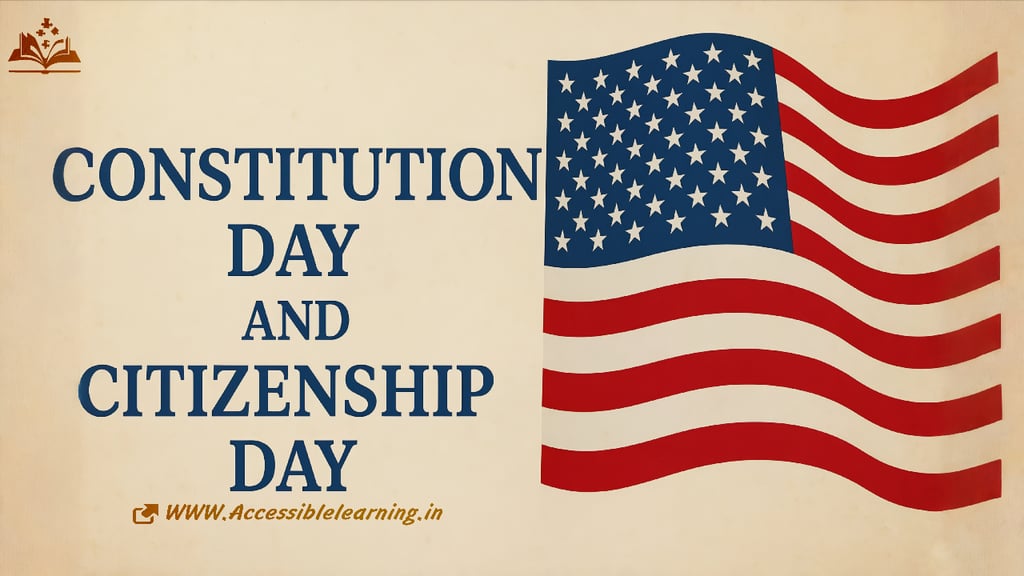
Constitution Day and Citizenship Day: Honoring America’s Founding Principles
Constitution Day and Citizenship Day, observed on September 17, honor the signing of the U.S. Constitution and celebrate the responsibilities of citizenship. Learn its history, significance, traditions, and modern relevance in strengthening American democracy.
EVENT/SPECIALUSACELEBRATION/FESTIVALS
Kim Shin
9/11/20254 min read


Every year on September 17, the United States observes Constitution Day and Citizenship Day, a significant occasion that honors the signing of the U.S. Constitution in 1787 and recognizes the rights and responsibilities of citizenship. This day serves as both a history lesson and a reminder of the enduring values that shape American democracy.
Historical Background
The U.S. Constitution Signing (1787): On September 17, 1787, delegates at the Constitutional Convention in Philadelphia signed the Constitution, laying the foundation of the nation’s laws, governance, and freedoms.
The Birth of Citizenship Day (1940): Originally known as “I Am an American Day,” it was introduced to celebrate new citizens.
Evolution into Constitution Day (2004): In 2004, Congress combined Constitution Day with Citizenship Day, creating a unified observance that reflects both the document’s legacy and the responsibilities of being a citizen.
Why Constitution Day Matters
The Constitution is more than just a legal framework—it represents:
Democracy and Liberty: It ensures freedom of speech, religion, and press while protecting individual rights.
Rule of Law: It creates checks and balances across the three branches of government.
Living Document: With 27 amendments, including the Bill of Rights, it adapts to evolving societal needs.
Constitution Day encourages Americans to reflect on these values, reminding everyone of their role in preserving democracy.
Citizenship Day: Understanding Responsibilities
While the Constitution defines rights, Citizenship Day emphasizes duties. Being a U.S. citizen involves:
Obeying Laws: Respecting the legal framework that protects freedom.
Voting: Participating in democratic processes to shape the nation’s future.
Community Service: Contributing to the well-being of society.
Respecting Diversity: Embracing inclusivity as a strength of the American identity.
For naturalized citizens, this day is especially meaningful—it represents the beginning of a new chapter as active members of the democratic process.
How It’s Observed
Educational Programs: Schools and colleges often hold special lessons on the Constitution’s history and importance.
Civic Engagement Activities: Communities organize discussions, debates, and public readings of the Constitution.
Federal Requirement: By law, federally funded institutions must provide educational programming on the Constitution during this week.
Some citizens also use this day to read the Constitution, reflect on its amendments, or participate in local community events.
Constitution Day in Today’s Context
In an era of rapid change—whether technological, political, or social—the Constitution continues to serve as a guiding compass. It reminds Americans that democracy requires active participation, accountability, and constant safeguarding of freedoms.
This observance is not only about honoring history but also about ensuring that future generations understand their role in shaping a just, inclusive, and democratic nation.
Key Takeaways
Date: September 17
Purpose: Commemorates the U.S. Constitution’s signing and highlights the responsibilities of citizenship.
Relevance Today: Encourages reflection on democracy, civic duty, and national unity.

The Role of the Founding Fathers
While the Constitution is often celebrated as a single document, its creation was the result of debates and compromises among key figures like James Madison (known as the Father of the Constitution), George Washington, Alexander Hamilton, and Benjamin Franklin. Each brought unique perspectives:
Madison emphasized checks and balances.
Hamilton argued for a strong central government.
Franklin pushed for compromise to ensure unity among states.
Their collaboration ensured that the Constitution could stand the test of time.
The Naturalization Process and Citizenship Day
For many immigrants, Citizenship Day marks the culmination of years of effort to become U.S. citizens. The naturalization process involves:
Meeting residency and moral character requirements.
Passing an English and civics test.
Taking the Oath of Allegiance, pledging loyalty to the United States.
On Citizenship Day, naturalization ceremonies are often held nationwide, making the day both personal and patriotic for new Americans.
Connection with the Bill of Rights
Though the Constitution was signed in 1787, it wasn’t until 1791 that the Bill of Rights was added. These first ten amendments guarantee freedoms like speech, press, religion, and the right to a fair trial. Constitution Day is an opportunity to highlight how these rights safeguard individual liberty in everyday life.
Constitution Day and Education
Beyond legal mandates for schools, many institutions use this day to:
Host mock constitutional conventions where students reimagine governance.
Organize essay contests on democracy and civic engagement.
Encourage students to explore how the Constitution applies to modern issues like digital privacy, free expression online, or equal rights.
Constitution Day in Civic Life
Public institutions and communities also recognize this day in unique ways:
Libraries display historical documents and offer lectures.
Local governments issue proclamations reinforcing civic pride.
Veterans’ organizations remind people of the sacrifices made to protect constitutional freedoms.
Such activities bridge the past with the present, fostering unity.
Global Relevance
Though it is uniquely American, Constitution Day resonates globally. The U.S. Constitution has inspired over 100 constitutions worldwide, influencing democratic principles such as separation of powers, judicial independence, and the concept of “We the People.”
Inspirational Quotes for Constitution Day
To deepen reflection, many Americans turn to words that capture the spirit of the Constitution:
“The Constitution is the guide that I never will abandon.” – George Washington
“We the People… are the rightful masters of both Congress and the courts.” – Abraham Lincoln
Such quotes remind citizens that the Constitution’s power lies in the hands of the people.
Constitution Day and Citizenship Day is more than just a commemoration of a historical event—it is a living reminder of America’s democratic values and civic responsibilities. By reflecting on the Constitution’s enduring principles and embracing the duties of citizenship, every American plays a role in safeguarding freedom and justice. Whether through education, civic participation, or welcoming new citizens, this day reinforces the idea that democracy thrives when people remain engaged, informed, and united under the promise of “We the People.”
Subscribe To Our Newsletter
All © Copyright reserved by Accessible-Learning Hub
| Terms & Conditions
Knowledge is power. Learn with Us. 📚


